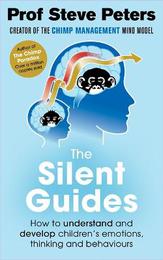
|
The Silent Guides: How to understand and develop children's emotions, thinking and behaviours
Paperback / softback
Main Details
| Title |
The Silent Guides: How to understand and develop children's emotions, thinking and behaviours
|
| Authors and Contributors |
By (author) Prof Steve Peters
|
| Physical Properties |
| Format:Paperback / softback | | Pages:320 | | Dimensions(mm): Height 216,Width 135 |
|
| Category/Genre | Popular psychology |
|---|
| ISBN/Barcode |
9781788700016
|
| Classifications | Dewey:158.1 |
|---|
| Audience | |
|---|
|
Publishing Details |
| Publisher |
Bonnier Books Ltd
|
| Imprint |
BLINK Publishing
|
| Publication Date |
15 November 2018 |
| Publication Country |
United Kingdom
|
Description
The Silent Guides explores some neuroscience and psychological aspects of the developing mind, unconscious thinking, behaviours, habit formation and related topics in an easy-to-understand way. It then offers practical ideas and thoughts for the reader to reflect on using 10 helpful habits as examples. This book has two themes: - To help adults to consider and understand where some of their unhealthy or destructive learnt behaviours and beliefs might have come from, and then offer ways to replace them with healthy and constructive behaviours and beliefs. - To offer ideas and support to parents, teachers or carers that could help children to form healthy and constructive habits and prevent unhealthy or destructive habits from developing. Examples of unhelpful thinking, behaviours and habits that can be changed include: Being overly self-critical Fear of failure and unforgiving perfectionism Worrying excessively or overreacting to situations Procrastinating Living with low self-esteem Examples of helpful thinking, behaviours and habits include: Smiling Getting over mistakes Developing a positive outlook Being able to talk through your feelings Seeking appropriate help Being proactive Written as a companion to My Hidden Chimp, these two interconnected books tackle how we can best manage our mind from childhood and into adulthood. Professor Steve Peters explains neuroscience in a straightforward and intuitive way - offering up 10 simple habits that we as adults and children should have in our arsenal to deal with everyday life. These 10 habits should and can be retained for life.
Author Biography
Prof Steve Peters is a Consultant Psychiatrist who specialises in the functioning of the human mind. He currently works across a range of areas including corporate work, health, education, elite sport and with all members of the public including families and children. In all areas he helps people to understand how their mind works, gaining insight into their own unique mind and situation and then attaining skills to optimise performance and quality of life. His work, both current and past, in the field of Psychiatry and Education includes, the National Health Service for over twenty years; Clinical Director of Mental Health Services, Forensic High Secure Hospital work with individuals with dangerous personality disorders, Senior Clinical Lecturer in medicine at Sheffield University since 1994, Undergraduate Dean for over 10 years, and visiting Professor at Derby University. He holds degrees, higher degrees and postgraduate qualifications in Medicine, Mathematics, Education, Medical Education, Sports Medicine, and Psychiatry. He is a member of the Royal College of Psychiatrists and is on the College Membership Panel for examinations; He acted as a member of the Therapeutic Use Exemption Panel for UK Sport for over ten years and has been an expert witness to WADA (World Anti-doping Agency); he has attended four Olympic Games and multiple World Championships working with over twenty Olympic and National teams. He is Chair of the Anti-Doping and Medical Committee for World Masters Athletics; and is the CEO of his own charity-supporting company, Chimp Management. He is the author of the best-selling personal development book The Chimp Paradox.
Reviews"It's the simplicity of his work that gives it power. If you want to master your mind, then Professor Steve Peters is the Mastermind." * Red Magazine * "He explores ten habits and suggests ways in which we can help children (and ourselves) towards positive ones. [...] I have really enjoyed this book, finding it helpful to have our brains and reactions explained in this way and finding the terminology useful, recognising and being able to talk about having a 'Chimp hijack'." * Juno Magazine *
|